
The Peloponnesian War was an ancient Greek war fought between Athens and Sparta and their respective allies for the hegemony of the Greek world. The war remained undecided for a long time, until the decisive intervention of the Persian Empire in support of Sparta. Led by Lysander, the Spartan fleet, built with Persian subsidies, finally defeated Athens and started a period of Spartan hegemony over Greece.

The 5th century BC started the first day of 500 BC and ended the last day of 401 BC.
Year 404 BC was a year of the pre-Julian Roman calendar. At the time, it was known as the Year of the Tribunate of Volusus, Cossus, Fidenas, Ambustus, Maluginensis and Rutilus. The denomination 404 BC for this year has been used since the early medieval period, when the Anno Domini calendar era became the prevalent method in Europe for naming years.
This article concerns the period 469 BC – 460 BC.

This article concerns the period 409 BC – 400 BC.
This article concerns the period 399 BC – 390 BC.
This article concerns the period 379 BC – 370 BC.
This article concerns the period 389 BC – 380 BC.

Lysander was a Spartan military and political leader. He destroyed the Athenian fleet at the Battle of Aegospotami in 405 BC, forcing Athens to capitulate and bringing the Peloponnesian War to an end. He then played a key role in Sparta's domination of Greece for the next decade until his death at the Battle of Haliartus.
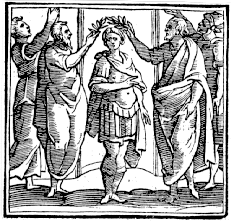
Thrasybulus was an Athenian general and democratic leader. In 411 BC, in the wake of an oligarchic coup at Athens, the pro-democracy sailors at Samos elected him as a general, making him a primary leader of the ultimately successful democratic resistance to the coup. As general, he was responsible for recalling the controversial nobleman Alcibiades from exile, and the two worked together extensively over the next several years. In 411 and 410, Thrasybulus was in command along with Alcibiades and others at several critical Athenian naval victories.
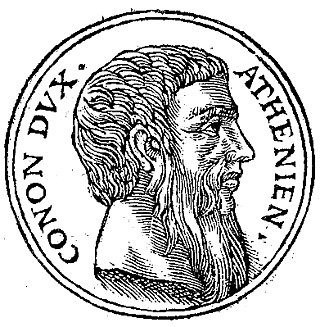
Conon was an Athenian general at the end of the Peloponnesian War, who led the Athenian naval forces when they were defeated by a Peloponnesian fleet in the crucial Battle of Aegospotami; later he contributed significantly to the restoration of Athens' political and military power.
Year 394 BC was a year of the pre-Julian Roman calendar. At the time, it was known as the Year of the Tribunate of Camillus, Poplicola, Medullinus, Albinus, Mamercinus and Scipio. The denomination 394 BC for this year has been used since the early medieval period, when the Anno Domini calendar era became the prevalent method in Europe for naming years.

Antalcidas, son of Leon, was an ancient Greek soldier, politician, and diplomat from Sparta.
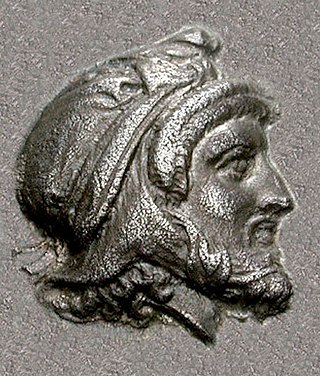
Pharnabazus II was a Persian soldier and statesman, and Satrap of Hellespontine Phrygia. He was the son of Pharnaces II of Phrygia and grandson of Pharnabazus I, and great-grandson of Artabazus I. He and his male ancestors, forming the Pharnacid dynasty, had governed the satrapy of Hellespontine Phrygia from its headquarters at Dascylium since 478 BC. He married Apama, daughter of Artaxerxes II of Persia, and their son Artabazus also became a satrap of Phrygia. According to some accounts, his granddaughter Barsine may have become Alexander the Great's concubine.

Chabrias was an Athenian general active in the first half of the 4th century BC. During his career he was involved in several battles, both on land and sea. The orator Demosthenes described him as one of the most successful commanders Athens ever had:
To sum up the whole: he is the only general who never lost a single city or post or ship or soldier, when he commanded you: none of your enemies has any trophy over you and him, while you have many over many enemies under his command.
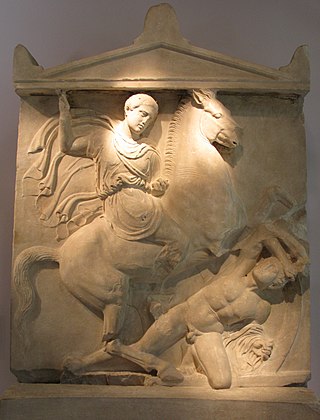
The Corinthian War was a conflict in ancient Greece which pitted Sparta against a coalition of city-states comprising Thebes, Athens, Corinth and Argos, backed by the Achaemenid Empire. The war was caused by dissatisfaction with Spartan imperialism in the aftermath of the Peloponnesian War, both from Athens, the defeated side in that conflict, and from Sparta's former allies, Corinth and Thebes, who had not been properly rewarded. Taking advantage of the fact that the Spartan king Agesilaus II was away campaigning in Asia against the Achaemenid Empire, Thebes, Athens, Corinth and Argos forged an alliance in 395 BC with the goal of ending Spartan hegemony over Greece; the allies' war council was located in Corinth, which gave its name to the war. By the end of the conflict, the allies had failed to end Spartan hegemony over Greece, although Sparta was durably weakened by the war.
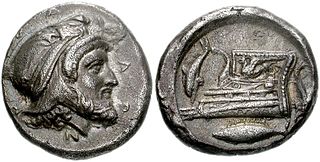
The Battle of Cnidus was a military operation conducted in 394 BC by the Achaemenid Empire against the Spartan fleet during the Corinthian War. A fleet under the joint command of Pharnabazus and former Athenian admiral, Conon, destroyed the Spartan fleet led by the inexperienced Peisander, ending Sparta's brief bid for naval supremacy.

Hellenica simply means writings on Greek (Hellenic) subjects. Several histories of 4th-century Greece, written in the mould of Thucydides or straying from it, have borne the conventional Latin title Hellenica. The surviving Hellenica is an important work of the Ancient Greek writer Xenophon and one of the principal sources for the last seven years of the Peloponnesian War not covered by Thucydides, as well as the war's aftermath.
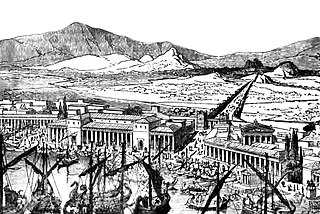
Although long walls were built at several locations in ancient Greece, notably Corinth and Megara, the term Long Walls generally refers to the walls that connected Athens' main city to its ports at Piraeus and Phaleron.
The First Peloponnesian War was fought between Sparta as the leaders of the Peloponnesian League and Sparta's other allies, most notably Thebes, and the Delian League led by Athens with support from Argos. This war consisted of a series of conflicts and minor wars, such as the Second Sacred War. There were several causes for the war including the building of the Athenian long walls, Megara's defection and the envy and concern felt by Sparta at the growth of the Athenian Empire.












